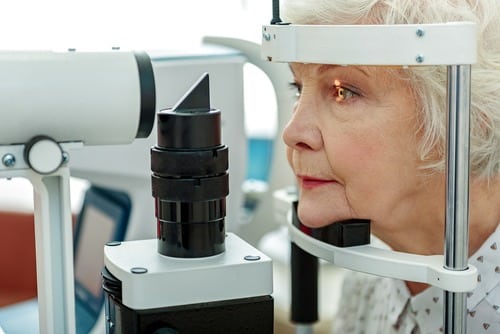An eye exam is a routine check-up of the health of your eyes and vision. During an eye exam, an eye doctor (an optometrist or an ophthalmologist) will assess your vision and check for any problems with your eyes.
Here are some things that may happen during an eye exam:
- Visual acuity test: This is a test to measure how well you see at different distances. You will be asked to read letters or numbers from a chart (Snellen chart) placed at various distances away from you.
- Refraction assessment: This is a test to determine the correct eyeglass or contact lens prescription for you. The doctor will ask you to look through a machine (phoropter) with different lenses and ask which one looks clearer.
- Slit-lamp examination: The doctor will use a special microscope called a slit lamp to examine the front and back of your eyes in detail. This allows the doctor to check for any abnormalities in the eye and look for signs of diseases or conditions such as cataracts, glaucoma, and age-related macular degeneration.
- Eye muscle test: The doctor will check the movement and coordination of your eye muscles.
- Pupil dilation: The doctor may dilate your pupils (enlarge them) using eye drops. This allows the doctor to get a better view of the back of your eyes, including the retina, optic nerve, and blood vessels.
- Glaucoma test: The doctor may check the pressure inside your eyes to check for glaucoma, a condition that damages the optic nerve.
The entire process usually takes about 30-60 minutes.
How Often Should I Get an Eye Exam?
The frequency of eye exams depends on your age, overall health, and whether you have any risk factors for eye diseases or conditions. Here are some general guidelines for how often you should get an eye exam:
- Children: Children should have their first eye exam at 6 months of age and then again at 3 years of age. After that, children should have an eye exam every 1-2 years until they are 18.
- Adults: If you are between the ages of 18 and 60 and have no vision problems or risk factors for eye diseases, you should have an eye exam every 2-4 years.
- Adults at higher risk: If you are over 60 years of age, have diabetes or a family history of eye diseases, or are at risk for glaucoma, you may need to have eye exams more frequently. Your eye doctor will advise you on the appropriate schedule for your specific needs.
It’s important to get regular eye exams to detect any problems early on, when they are most treatable. If you notice any changes in your vision or have any concerns about your eye health, you should see an eye doctor as soon as possible.

